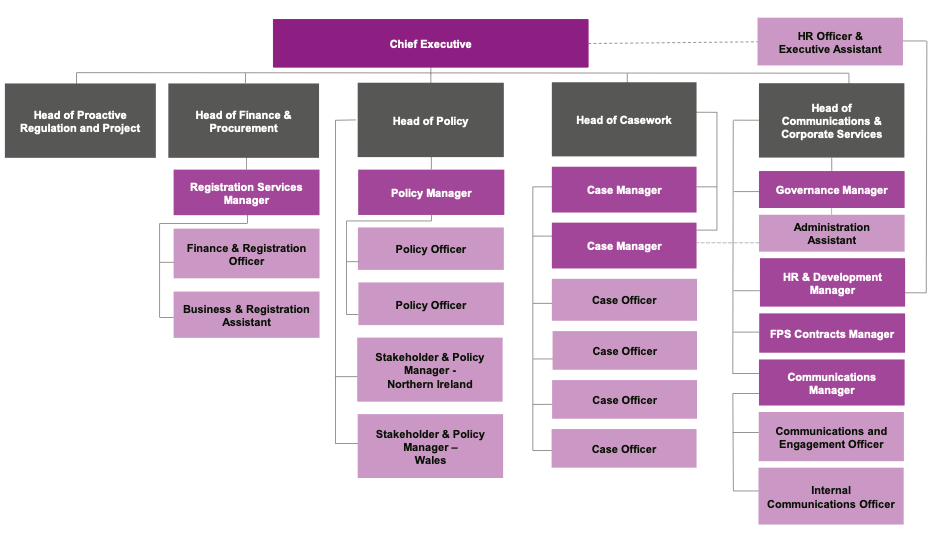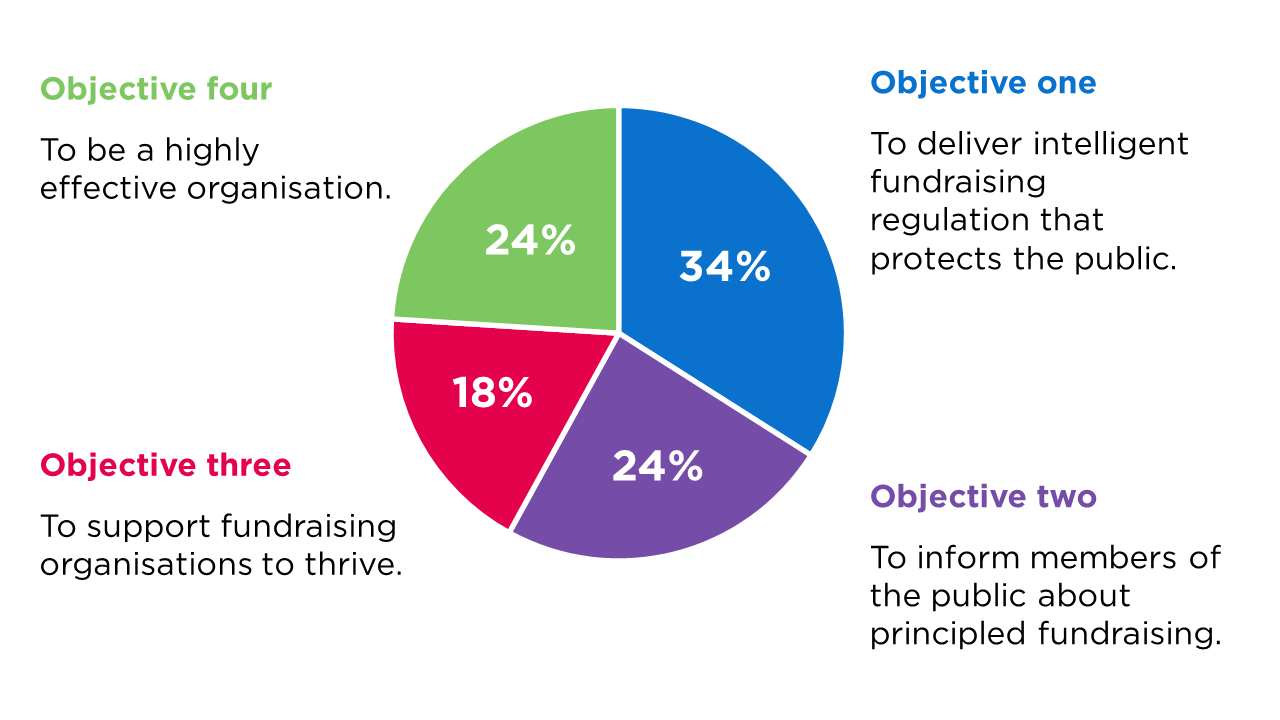Contents
Introduction
This is the second business plan that falls within the scope of our Strategic Plan 2022 – 2027. The strategy sets out our view of how we will deliver the effective regulation of charitable fundraising over the next five years.
Themes
Our regulation is risk, evidence and outcomes based. There are cross-cutting themes running through our objectives, which together will guide us to regulate charitable fundraising effectively. These are:
- Innovative: We will keep abreast of digital and wider social developments and how these may shape fundraising into the future. Our regulation will evolve accordingly.
- Proactive: We will continue to develop our proactive approach, strengthening the work we do to ensure compliance with the code, in addition to complaints handling. We will prioritise proactive regulation where we identify issues that may cause harm to the public or damage to the reputation of charitable fundraising even if those issues have not attracted complaints.
- Intelligent: We will use our data more intelligently to support the development of the code and our compliance work. We will collect and share fundraising data from others to inform our regulatory priorities and to share knowledge and learning.
- Collaborative: We will bring in views from across the fundraising sector and the wider public so that we remain a thought leader in fundraising. We will create new information sharing opportunities to ensure that fundraisers and the public have a greater voice in developing our policies. As part of this, we will strengthen relationships with other regulators and government.
Strategic objectives
All our work is delivered in line with the following strategic objectives:
- To deliver intelligent fundraising regulation that protects the public.
- To inform members of the public about principled fundraising.
- To support fundraising organisations to thrive.
- To be a highly effective organisation.
This year’s budget allows us to deliver our core business as usual activity, alongside key 2023/24 projects. This effectively means:
- Continuing to offer advice on high standards of fundraising through our code advice service, available either online or over the phone.
- Managing complaints casework at about 100 complaints per month (1,200 per year).
- Maintaining Fundraising Levy and registration activity at present levels, with the additional capacity to process up to 70 new applications per month for registration and increasing numbers of annual renewals.
- Operating the Fundraising Preference Service (FPS) at present or at increased levels of activity.
Priorities for this year
The priorities for this year are as follows:
To deliver intelligent fundraising regulation that protects the public
We will review and update the Code of Fundraising Practice (the code) to ensure it remains up to date by reflecting changes in legislation, technology, and fundraising behaviour.
Through ongoing engagement with key stakeholders we will produce an accessible, proportionate and flexible regulatory framework that protects the public while avoiding undue constraints on charitable fundraisers.
Key deliverables
- Undertake a 12-week public consultation starting in September 2023, seeking views from a wide range of stakeholders on proposals to update and improve the Code of Fundraising Practice
- Conduct in-depth research into the public’s experience and expectations of charitable fundraising to ensure public views are included in considerations of changes to the Code.
- Publish a summary of feedback gathered from the public consultation and a report outlining the findings of the public research.
- Produce an updated code taking account of feedback gathered through public consultation and public research, followed by a secondary consultation on new code.
- Complete introduction of an internal Intelligence Report and Project Log to secure the foundation and structure for effective and sustainable intelligence gathering in the long term.
- Complete review of data science and AI requirements for intelligence gathering and project execution and start to procure resources and/or staff expertise.
- Complete stakeholder engagement workplan to secure relationships for intelligence sharing and collaborative working across the UK.
- Recruit to expand the Proactive Regulation and Projects function with a view to progressing intelligence gathering to proactive projects.
To inform members of the public about principled fundraising
We have seen that the public still give generously, despite the financial pressures that many of them will have been from the cost of living crises.
It is our role to make sure that whatever fundraising is taking place, standards remain high, and the public continues to be protected.
We will continue to operate an open and accessible complaints service that offers the public independent investigation of their complaints and assistance in getting them resolved. We will also continue to provide a way for the public to manage their communications with charities through the FPS.
Key deliverables
- Carried over from 2022, develop a new communications strategy to engage and protect the public.
- Continue to develop additional public facing materials to help them understand fundraising and to make informed decisions about which causes to support.
Update our website to make it easier to navigate, particularly for members of the public.
- Continue to work with other regulators and relevant bodies to provide joint public messages to further emphasise and increase the reach of our safer giving campaigns.
To support fundraising organisations to thrive
Alongside the work we are doing to update the code we will continue to ensure that organisations fundraise in a way that is legal, open, honest, and respectful
We will do this by continuing to share learning through our Annual Complaints Report and the summaries of our casework. In addition, we will also consider the feedback we have received from our survey on sharing information about fundraising complaints to determine what changes we might want to make to part 2 of our Annual Complaints Report in the future.
Key deliverables
- Create a panel of fundraisers and/or fundraising compliance staff to share insights on fundraising practice probably using existing mechanisms in the charitable sector.
- Publish guidance for fundraisers on commercial participator and partner arrangements.
- Publish the Annual Complaints Report
- Review part 2 of the Annual Complaints Review and engage with the sector on proposals to make improvements to that part of the report
- Publish timely summaries of completed investigations highlighting areas of code breach and recommendations for improvement.
- Delayed from 2022, review the self-reporting pathway and produce additional guidance on reporting thresholds.
- Make available a digital badge that registered organisations can use to demonstrate their commitment to high standards of fundraising.
To be a highly effective organisation
This year we will undertake an engagement exercise with the charity sector to ensure that the way that we are funded (through the levy) allows us to deliver the regulation required now and for the future. We will continue to carefully monitor our expenditure to ensure we are offering value for money and make efficiencies where possible. We are keenly aware of how we are funded, the pressures on everyone and we take our budgeting responsibilities seriously. Subject to the outcome of the engagement exercise changes to the levy and registration fees will take effect in September 2024.
We are aware of the wider societal and political contexts in which we operate and our position as a regulator. This position means that we take matters such as modern slavery, sustainability, and equality, diversity, and inclusion, seriously and work to make continuous improvements.
Key deliverables
- Engagement with the charity sector on proposed changes to the Fundraising Regulator’s levy
- Develop sustainability policy, and implement changes required to ensure that we are considering the environmental impact of our work.
- Continue to develop our work on EDI to ensure that it remains at the forefront of our policies and decisions.
Resources
Charity and non-charity registration scheme
The Fundraising Regulator’s scheme of voluntary fundraising regulation in England, Wales and Northern Ireland is mainly funded by the Fundraising Levy. The levy is paid by the charitable organisations that conduct the most fundraising activity. Around 2,000 charities are currently within the scope of the levy, which is based on a sliding scale of payments for all charities spending £100,000 or more on fundraising per year.
The rest of our income comes primarily from a registration scheme for smaller fundraising charities and non-charities (such as commercial businesses, Community Interest Companies and public interest bodies) that engage in charitable fundraising. Smaller charities spending less than £100,000 a year on fundraising pay £50 a year to register with us. Non-charities pay registration fees on a sliding scale according to their fundraising turnover.
All organisations that commit publicly to meeting the Code of Fundraising Practice, and pay the relevant registration fee (currently just over 6000 bodies), can display the Fundraising Badge on their fundraising materials, and are encouraged to do so.
Budget for 2023/24
Our budget for 2023/24 is about £3.1million which represents an increase to our planned expenditure in previous years of £0.4m. This will enable us to support an expanded staff team to deal with a growth in complaints work and carry out more regulatory activities.
In terms of income, we expect to raise about £2.7 million in 2022/23. Around 92%, or £2.5 million, is forecast from the levy, while an additional £200,000 will come from smaller charity registrations and another £160,000 from non-charity registrations.
In previous years our reserves grew as wider circumstances meant we were not able to deliver everything that we had budgeted for. This year we are operating a deficit budget of around £0.4 million and plan to fund this by drawing on our reserves. This will enable us to complete the work we were unable to do earlier, alongside new work without having to raise the levy. Next year we plan to eliminate the deficit by increasing levy and registration fees from 1 September 2024 and will be engaging with the sector about our plans in late 2023.
Staffing
Our commitment to offering value for money means we look to regulate in a way that is as efficient and effective as possible. This includes making sure our workforce remains skilled and supported to do their work.
Our staffing costs constitute a substantial part of our expenditure in 2023/24 at about 60%. This year we are starting up a pro-active regulation and projects function. We have taken on the head of the team for this function. We are also adding extra staff in our casework team to deal with increased caseloads and are recruiting a digital communications officer. This will result in 32 members of staff (up from 27 last year) working in five teams – pro-active regulation and projects, casework; communications and corporate services; finance and procurement; and policy).

Budget summary
| 2023/24 | |
|---|---|
| Total expenditure | £3,095,000 |
| Projected income | |
| Levy | £2,300,000 |
| Small charity registration | £203,000 |
| Non-charity registration | £164,000 |
| Other income | £15,000 |
| Total | £2,682,000 |
| Deficit | -£412,000 |
Budget summary by cost centre
| Expenses by Cost Centre | 2002/23 | 20023/24 | Change |
|---|---|---|---|
| Levy and Finance | £224,000 | £241,000 | £17,000 |
| FPS Project | £244,000 | £236,000 | -£8,000 |
| Policy | £313,000 | £313,000 | 0 |
| Casework | £384,000 | £525,000 | £141,000 |
| Projects | £103,000 | £139,00 | £36,000 |
| Secretariat & Comms | £427,000 | £493,000 | £66,000 |
| Proactive Regulation | £63,000 | £262,000 | £199,000 |
| Administration | £195,000 | £216,000 | £21,000 |
| Board and Governance | £169,000 | £175,000 | £6,000 |
| Premises | £140,000 | £151,000 | £11,000 |
| Professional fees | £117,000 | £114,000 | -£3,000 |
| Public Engagement | £322,000 | £230,000 | -£92,000 |
| Total Expenditure | £2,701,000 | £3,095,000 | £394,000 |

Budget £3095m split by corporate objectives